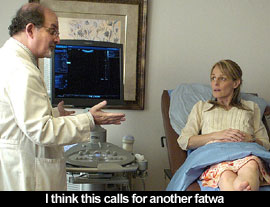½*/****
starring Matthew Broderick, Colin Firth, Helen Hunt, Bette Midler
screenplay by Alice Arlen and Victor Levin & Helen Hunt and Helen Hunt (<–not a typo)
directed by Helen Hunt
 by Walter Chaw Mamet-lite–which is to say "garbage-lite"–for the most part, the dialogue in Helen Hunt's hyphenate debut is repetitive and deeply irritating, especially as delivered by Hunt in that perpetually whinging, laconic fashion of hers. Marry it to a directing style that could gently be called "self-aggrandizing" and generally be called "static" and Then She Found Me thuds into place as one of the most atrocious things to collapse on the silver screen in months. Here Hunt is Barbra Streisand without the singing, optimistically cast as a woman "about to turn forty" while asking poor, mortgage-needing Colin Firth to twice opine that her increasingly cadaverous-looking self is "beautiful" and "gorgeous." To each his own, of course, but Hunt the director/prime mover (she co-wrote and produced the benighted thing) sticking herself in front of a conservative gross of close-ups and pushing others to compliment her appearance is so far beyond distasteful that it's boring. Adoption, artificial insemination, infertility, miscarriage, infidelity, lumpen milquetoast Matthew Broderick as the really, really obscure object of desire, and stereotypes about East Coast Jews pollute this godawful mess like Union Carbide in some unfortunate, populous third-world nation. Call said ghetto the "arthouse" (its citizens, what the hell, "festivalgoers") and point to it whenever the random, ossified, effete intellectuals offer that they prefer to watch "indies" in the "arthouse," eschewing "mainstream" cinema with a sniff, a wave of a hanky, and a puff of talcum.
by Walter Chaw Mamet-lite–which is to say "garbage-lite"–for the most part, the dialogue in Helen Hunt's hyphenate debut is repetitive and deeply irritating, especially as delivered by Hunt in that perpetually whinging, laconic fashion of hers. Marry it to a directing style that could gently be called "self-aggrandizing" and generally be called "static" and Then She Found Me thuds into place as one of the most atrocious things to collapse on the silver screen in months. Here Hunt is Barbra Streisand without the singing, optimistically cast as a woman "about to turn forty" while asking poor, mortgage-needing Colin Firth to twice opine that her increasingly cadaverous-looking self is "beautiful" and "gorgeous." To each his own, of course, but Hunt the director/prime mover (she co-wrote and produced the benighted thing) sticking herself in front of a conservative gross of close-ups and pushing others to compliment her appearance is so far beyond distasteful that it's boring. Adoption, artificial insemination, infertility, miscarriage, infidelity, lumpen milquetoast Matthew Broderick as the really, really obscure object of desire, and stereotypes about East Coast Jews pollute this godawful mess like Union Carbide in some unfortunate, populous third-world nation. Call said ghetto the "arthouse" (its citizens, what the hell, "festivalgoers") and point to it whenever the random, ossified, effete intellectuals offer that they prefer to watch "indies" in the "arthouse," eschewing "mainstream" cinema with a sniff, a wave of a hanky, and a puff of talcum.
